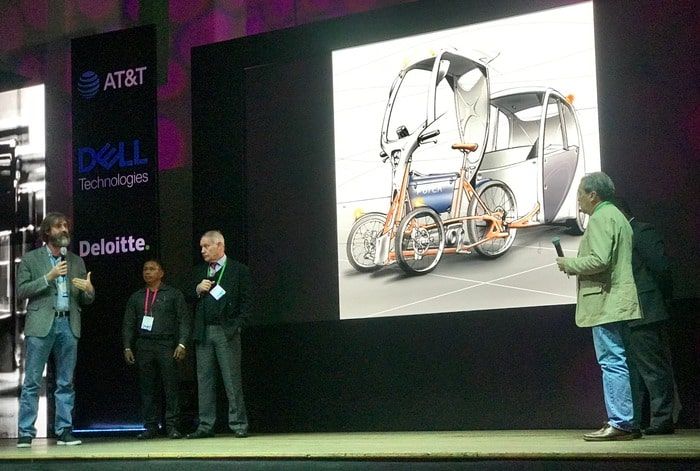Ford pushes electric bicycle taxi project in Mexico City
TRICI-Taxi Electric Suburban Project seeks to develop a dozen prototype electric bicycle taxis for passengers, people with motor disabilities, where a wheelchair can enter, and cargo.

On its way from being an automotive manufacturing company to service, mobility, technology, and car company, Ford has designed the City One Challenge program. At the beginning of the last century, Henry Ford, the company's founder, focused on facilitating the mobility of people and found the answer in the development and production of automobiles. But in the 21st century, this business model has been overtaken.
While the global automotive industry generates about $2.3 billion a year from vehicle sales, the mobility services market generates about $6 billion, for mostly technology firms like Uber. Ford's bid to take a slice of this pie is to work with large and small companies to develop new mobility applications and solutions.
To that end, Ford Motor Company announced in March 2016 the creation of Ford Smart Mobility LLC, a new subsidiary, with operations in Palo Alto, California, and Dearborn, Michigan, created to design, build, grow and invest in emerging mobility services. As part of the strategy, Ford launched in 2018 a crowdsourcing program, called City Challenge, for residents, businesses and community groups to propose and experiment with solutions that improve mobility in cities. Each challenge is tailored to the specific city or county and focuses on addressing their unique needs.
The program was launched in Pittsburgh, Pennsylvania; Miami-Dade County, Florida; and Grand Rapids, Michigan. All three challenges resulted in ongoing pilots that addressed problems ranging from long and inefficient school pick-up lines to safer transportation methods for night shift workers who must travel during non-traditional hours. This year, the program was launched in Indianapolis, Indiana; Detroit, Michigan; Austin, Texas; and Mexico City, Mexico.
City: One Challenge Mexico
Ford launched in May a call in Mexico for, in conjunction with the government of Mexico City, citizens, civil organizations and companies, to propose mobility solutions, from which a winner will be chosen to get $100,000 dollars (about two million pesos) to implement the idea. This is the first initiative of the subsidiary outside the United States and the intention is to find solutions that work at different scales, with a focus on improving the mobility of vulnerable groups, such as women, older adults, or people with disabilities, in the periphery of Mexico City.
There were 171 proposals, from which 12 finalists were chosen and evaluated by a committee made up of Ford executives, the Mexico City government, as well as Ford partners (AT&T, Microsoft, and Dell) and community groups. The winning proposal was presented by the companies FOTCA (Frente de Organizaciones de Transporte Colectivo y Alternativo, A.C) and Arietis Sapi de CV, who together developed the MX3 project: TRICI-Taxi Electrico Suburbano, which aims to develop electric vehicles as a more efficient and safe alternative to motorized taxis circulating in Mexico City and the metropolitan area.
According to data from the Secretariat of Mobility of Mexico City, in the outskirts of the capital, mainly in the municipalities of Gustavo A. Madero, Azcapotzalco, Tlahuac, and Xochimilco operate about 20,000 motorcycle taxis, which make about 400,000 trips daily. In addition, there are another 30,000 operating in the metropolitan area, making some 600,000 trips a day.
"The motorcycle taxi has become the means of transportation for women and children in the suburbs of Mexico City: two out of every three trips are made by this profile of users," said Alejandro Rosas, leader of mobility at Ford de Mexico, in an interview with Automotive News Mexico on Wednesday.
The MX3: TRICI-Taxi Electric Suburban Project seeks to develop a dozen prototype electric bicycle taxis for passengers, people with motor disabilities, where a wheelchair can enter, and cargo.




